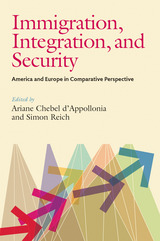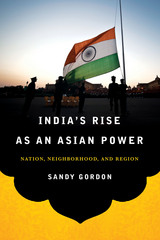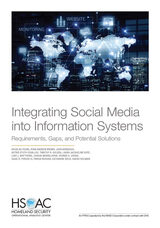8 start with I start with I

At the core of much policy debate is the inherent paradox whereby immigrant populations are frequently perceived as posing a potential security threat yet bolster economies by providing an inexpensive workforce. Strict attention to border controls and immigration quotas has diverted focus away from perhaps the most significant dilemma: the integration of existing immigrant groups. Often restricted in their civil and political rights and targets of xenophobia, racial profiling, and discrimination, immigrants are unable or unwilling to integrate into the population. These factors breed distrust, disenfranchisement, and hatred-factors that potentially engender radicalization and can even threaten internal security.
The contributors compare policies on these issues at three relational levels: between individual EU nations and the U.S., between the EU and U.S., and among EU nations. What emerges is a timely and critical examination of the variations and contradictions in policy at each level of interaction and how different agencies and different nations often work in opposition to each other with self-defeating results. While the contributors differ on courses of action, they offer fresh perspectives, some examining significant case studies and laying the groundwork for future debate on these crucial issues.


India’s Rise as an Asian Power examines India’s rise to power and the obstacles it faces in the context of domestic governance and security, relationships and security issues with its South Asian neighbors, and international relations in the wider Asian region. Instead of a straight-line projection based on traditional measures of power such as population size, economic growth rates, and military spending, Sandy Gordon’s nuanced view of India’s rise focuses on the need of any rising power to develop the means to deal with challenges in its domestic, neighborhood (South Asia), and regional (continental) spheres.
Terrorism, insurgency, border disputes, and water conflict and shortages are examples of some of India’s domestic and regional challenges. Gordon argues that before it can assume the mantle of a genuine Asian power or world power, India must improve its governance and security; otherwise, its economic growth and human development will continue to be hindered and its vulnerabilities may be exploited by competitors in its South Asian neighborhood or the wider region. This book will appeal to students and scholars of India and South Asia, security studies, foreign policy, and comparative politics, as well as country and regional specialists.

In 1980 the ZANU/PF government of Robert Mugabe came to power after an extended war of liberation. They inherited a cluster of emergency laws similar to those available to the authorities in South Africa. It was also the beginning of the cynical South African state policy of destabilization of the frontline states. This led to a dangerous period of insurrection in Mashonaland and increased activity by Renamo.
Dr. Hatchard uses the case of Zimbabwe to ask questions about the use of authority in contemporary African states. He examines:
1. Whether and in what circumstances the declaration and retention of a state of emergency is justified;
2.The scope of emergency regulations and their impact on individual freedoms;
3.What safeguards are necessary in order to protect those freedoms during a state of emergency.
The relationship is studied from a political as well as a legal perspective. Dr. Hatchard examines the role law has played, is playing and may play. The author concludes that, even if the state of emergency is justified, this does not necessitate the curtailment of the exercise of individual freedoms.
There are many comparisons with the rest of Africa. The book is of practical importance for members of the judiciary, legal practitioners, politicians and human rights organizations. The difficult questions it poses make stimulating teaching material for students of the Third World who want to understand the reality of the exercise of power in fragile situations.


How can the United States avoid a future surprise attack on the scale of 9/11 or Pearl Harbor, in an era when such devastating attacks can come not only from nation states, but also from terrorist groups or cyber enemies?
Intelligence and Surprise Attack examines why surprise attacks often succeed even though, in most cases, warnings had been available beforehand. Erik J. Dahl challenges the conventional wisdom about intelligence failure, which holds that attacks succeed because important warnings get lost amid noise or because intelligence officials lack the imagination and collaboration to “connect the dots” of available information. Comparing cases of intelligence failure with intelligence success, Dahl finds that the key to success is not more imagination or better analysis, but better acquisition of precise, tactical-level intelligence combined with the presence of decision makers who are willing to listen to and act on the warnings they receive from their intelligence staff.
The book offers a new understanding of classic cases of conventional and terrorist attacks such as Pearl Harbor, the Battle of Midway, and the bombings of US embassies in Kenya and Tanzania. The book also presents a comprehensive analysis of the intelligence picture before the 9/11 attacks, making use of new information available since the publication of the 9/11 Commission Report and challenging some of that report’s findings.

This textbook introduces students to the critical role of the US intelligence community within the wider national security decision-making and political process. Intelligence in the National Security Enterprise defines what intelligence is and what intelligence agencies do, but the emphasis is on showing how intelligence serves the policymaker. Roger Z. George draws on his thirty-year CIA career and more than a decade of teaching at both the undergraduate and graduate level to reveal the real world of intelligence. Intelligence support is examined from a variety of perspectives to include providing strategic intelligence, warning, daily tactical support to policy actions as well as covert action. The book includes useful features for students and instructors such as excerpts and links to primary-source documents, suggestions for further reading, and a glossary.

Raffaella A. Del Sarto examines the creation of Israel's neo-revisionist consensus about security threats and regional order, which took hold of Israeli politics and society after 2000 and persists today. The failed Oslo peace process and the trauma of the Second Palestinian Intifada triggered this shift to the right; conflicts with Hamas and Hezbollah and the inflammatory rhetoric of Iranian President Ahmadinejad additionally contributed to the creation of a general sense of being under siege. While Israel faces real security threats, Israeli governments have engaged in the politics of insecurity, promoting and amplifying a sense of besiegement. Lively political debate has been replaced by a general acceptance of the no-compromise approach to security and the Palestinians. The neo-revisionist right, represented by Benjamin Netanyahu and the Likud, has turned Israel away from the peace process and pushes maximalist territorial ambitions. But they have failed to offer a vision for an end to conflict, and there has been little debate about whether or not the hardline policies toward the region are counterproductive. Del Sarto explains this disappearance of dissent and examines the costs of Israel’s policies. She concludes that Israel’s feeling of being under siege has become entrenched, a two-state solution with the Palestinians is highly unlikely for the foreseeable future, and Israel’s international isolation is likely to increase. Del Sarto’s analysis of this tense political situation will interest scholars and students of the Israeli-Palestinian conflict, Middle East Studies, and International Relations.
READERS
Browse our collection.
PUBLISHERS
See BiblioVault's publisher services.
STUDENT SERVICES
Files for college accessibility offices.
UChicago Accessibility Resources
home | accessibility | search | about | contact us
BiblioVault ® 2001 - 2024
The University of Chicago Press









